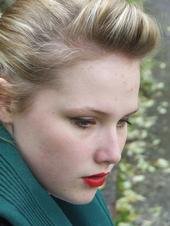Observations of a plus size model: how the media influences us
- Jessica Adams

- Mar 21, 2019
- 3 min read
Updated: Apr 14, 2022
I don’t know whether you have dived into the free module we’re offering and you have explored the complexities and issues around comparison. If not, check it out. It’s under ‘Free Trial Material’ under 'The Warrior Program' on the menu bar. But here, I’m just going to write about a passion area of mine, which is broader than comparison work. This is the effect that media platforms have on self-esteem, self-worth, self-perception and mental health.
I can’t remember a time when I wasn’t fascinated with this topic. I think this is because I am highly susceptible to letting the media influence my own belief systems and perception of myself.
When I was sixteen, I went on my first photo-shoot. I was nervous, but went with friends. The photographer said I had some real talent, and came alive in front of the camera. The creativity excited me, and looking at what we had created afterwards was really fulfilling and empowering. This turned into shoots with friends, taking amateur shots on mum’s old camera for fun. I had a lot of creative friends studying photography and fashion so I was everyone’s favoured guinea pig for school or college projects.
I started modelling for photographers when I was twenty two.

At the time, I was studying my master’s in education and social work. I had also been appointed as a pastoral manager for vulnerable students in a mainstream secondary school.
My role in the school was to bridge the attainment gap between the students under my remit compared with their peers. In order to do this, I recognised that if there were any attainment gaps in my students, this may not be for academic reasons. Therefore, I met with all my students and got to know their interests, backgrounds, and barriers to learning from their own perspective.
I came to find that with my older female students, one common theme was their preoccupation with aspiring to the unattainable images and rhetoric of the media. They would discuss body image hang ups, and disordered behaviours in order to ‘conform.’

This realisation led to my first taught module. I designed and facilitated a six week course; ‘the misconceptions of the media.’ In this, I exposed Photoshop. I explored the amount of hours young people spend consuming media messages. I exposed disordered eating forums designed to attract children. I exposed data on the relationship between the decline of mental wellbeing when young people consume these messages. I also called out male mental health and the link to conformity.


This module was a total success. It was so rewarding seeing the penny drop with the students and subsequently, this was put into the national curriculum.
I was then invited to give a lecture on my research for the module, how I designed and facilitated the module, and share the feedback from the students. I gave this three hour lecture to undergraduate and post graduate students and they were also shocked at the research I presented.
From then I developed an understanding that I had a rather unique perspective. Modelling, in a way is conforming to societal norms. I have had my body manipulated by Photoshop, yet, I am acutely aware of how this affects the people consuming those images and messages.

Modelling in the plus size industry does include a far bigger emphasis and recognition of the body positivity movement, but it isn’t without its biases to small waists, proportions and height.
Below I have added a video which explores how dangerous these messages are in the advertisements that we digest as consumers.
Jean Kilbourne is a public speaker, writer, filmmaker and activist who is internationally recognised for her work on the image of women in advertising.
Let me know your thoughts in the comments.








Comments